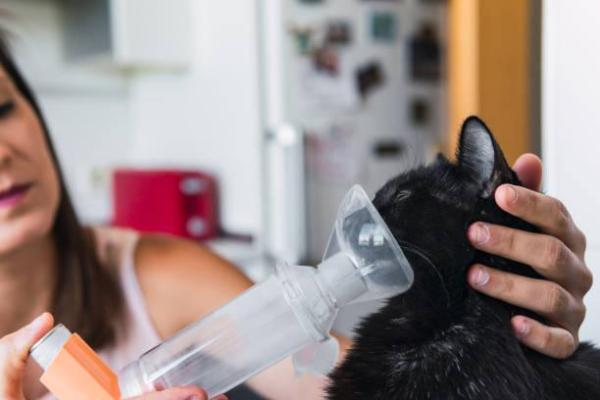Pulmonary Edema in Cats Life Expectancy



See files for Cats
Pulmonary edema in cats consists of the abnormal accumulation of fluid in the interstices and alveoli of the lungs, making it difficult for oxygen to circulate through them. This can obstruct normal breathing and endanger the life of the cat. There are various causes which can present either acutely or chronically, with greater or lesser severity. This variables make determining pulmonary edema life expectancy in cats difficult.
A diagnosis of pulmonary edema is serious and must be treated by a veterinarian. There is the possibility of the problem being fatal, but it is very important to remember that pulmonary edema in felines is a symptom and not a disease. Its underlying causes are varied and will be instrumental in determining their prognosis and life expectancy. AnimalWised reveals more about the prognosis of pulmonary edema in cats to help you know what to expect.
Prognosis of a cat with pulmonary edema
The prognosis of any disease is the expected outcome of the effects on the animal's organism. It is something which will only be determined by the veterinarian. While based on expert knowledge and experience, it is not something which can be determined with complete accuracy. With pulmonary edema, the underlying disease will inform the prognosis, as will other factors such as age and overall health status of the cat.
As a symptom, pulmonary edema consists of the accumulation of fluid in the lungs. The presence of this fluid complicates breathing, the extent largely depending on the amount of fluid present. When a cat has this condition, the following symptoms of pulmonary edema complications may arise:
- Trouble breathing
- Mouth open and neck stretched in an attempt to catch more air
- Wheezing sounds
- Cough
- Coughing up blood
- Bluish color of the mucous membranes (cyanosis)
- Agitation
The prognosis and life expectancy of a cat with pulmonary edema does not only depend on the severity of the underlying condition. We must also take into account the nature of the disease:
- Acute form: cats can suffer acute pulmonary edema, for example after an accident or poisoning.
- Chronic form: as a consequence of some disease or health condition that may have gone unnoticed until respiratory difficulties in the cat were observed. Whether the cause of the edema is treatable will logically influence the prognosis.
Other factors in determining the prognosis of the pulmonary edema include the speed of treatment administration. If the problem is allowed to worsen without intervention, the problem may progress to the point that treatment cannot help. For this reason, it is of vital importance that we report any respiratory difficulty to a veterinarian. Early intervention can be the reason we avoid preventable death.
In addition to pulmonary edema, we look at the other reasons a cat may be coughing up blood in our related article.
How long does a cat live with pulmonary edema?
We cannot give an exact answer to this question. As we have explained, the life expectancy of a cat with pulmonary edema will depend on factors such as severity and cause. In other words, a specific pulmonary edema that is treated quickly, can be an isolated event. Once the edema is under control and we have given the cat sufficient recovery time, it may not significantly affect the cat's overall life expectancy.
Conversely, if we let the pulmonary edema progress without treatment, it can cause irreparable damage. This can affect the life expectancy of the cat. Similarly, if the treatment is provided too late or is inadequate, the cat may die because of the edema.
If pulmonary edema is related to a disease that can be treated, but not cured, it may recur from time to time. Even if we provide treatment, the cat's quality of life may worsen. They may not recover from episodic onset of edema, reducing their life expectancy.
Discover more about tracheal collapse in cats, another reason why a cat may have difficulty breathing.
What influences the life expectancy of a cat with pulmonary edema?
Throughout the previous sections we have mentioned certain elements that will directly influence the life expectancy of cats with pulmonary edema. Here we explain these factors:
- Cause of edema: a specific edema is a localized edema to the lung and may be idiopathic. Others are symptoms of a particular disease which may be incurable. This will mean the edema can persist over time. Other aspects of the underlying disease will also influence their life expectancy.
- Severity: by this we refer to the extent of the edema and the symptoms it triggers.
- Overall health of the cat: the health status of the cat prior to the edema is also important. Some cats are particularly vulnerable such as those that are very old or very young. Others may have a weakened immune system due to a preexisting health condition or have some other influential illness.
- Treatment: if we delay providing veterinary care to the cat, the edema could become fatal. Similarly, it will be important to scrupulously follow the treatment prescribed by the veterinarian. Whether or not the treatment is effective will also influence life expectancy.
- Care: in addition to treatment, we must offer care to our cat at home to improve their condition. This is supportive therapy, especially important when the disease has no specific treatment. The level of care we provide can mean the difference between life and death in a cat with pulmonary edema.
We look at the care we need to provide for cats with pulmonary edema in the section below. Discover the reasons a cat coughs up white foam in our related article.

How to care for a cat with pulmonary edema
We will only know a cat has pulmonary edema when it has been diagnosed by a veterinarian. It is important to know that symptoms of this condition can be shared with other diseases. Misdiagnosis of pulmonary edema is also something which can shorten their life expectancy. We need to ensure we listen to the veterinarian's advice and not try any home remedies for pulmonary edema. Doing so as replacement for traditional medicine can be fatal.
The treatment administered by the veterinarian will be dependent on various factors. They may provide initial oxygen and fluid therapy, as well as diuretics to stabilize the cat. Drainage of the edema may not be carried out as with other types of fluid buildup.
Once emergency treatment has been carried out and the cat is stabilized, there are certain things we can do to best ensure the cat recovers well. They include the following:
- Physical activty: we must control the cat's activity, especially if they feel the need to exercise. Intense physical activity carried out too soon can worsen their condition or at least set them back
- Feeding: in some cases, the diet must be adapted to the cause that triggered the edema. It is important, to offer a mixed diet of both dry kibble and we food. This will help promote good hydration, especially if we are treating them with diuretics.
- Hydration: can also be encouraged by providing plenty of clean and fresh water. If the cat is very weak at the beginning, we may even offer ice cubes or administer fluid with an oral syringe.
- Weight: also related to diet is the maintenance of the animal's ideal weight, since obesity could complicate the clinical picture severely.
- Hygiene: if the cat is treated with diuretics, it is normal for them to urinate a considerable amount after administration. We must be vigilant and keep the litter box as clean as possible, especially if our cat is one of those who refuses to use a dirty litter tray.
- Stress: given how easily cats get stressed, it is advisable to limit all known or potential stress triggers as much as possible. These include moving home, visits from strangers, loud noises, the presence of other animals, etc. Stress could negatively affect breathing.
Now that we know about the life expectancy of a cat with pulmonary edema, it is important we immediately take the cat to a veterinarian if we see a worsening of their symptoms after treatment. Read our related guide to learn about the other possible reasons for labored breathing in cats.

This article is purely informative. AnimalWised does not have the authority to prescribe any veterinary treatment or create a diagnosis. We invite you to take your pet to the veterinarian if they are suffering from any condition or pain.
If you want to read similar articles to Pulmonary Edema in Cats Life Expectancy, we recommend you visit our Breathing diseases category.






